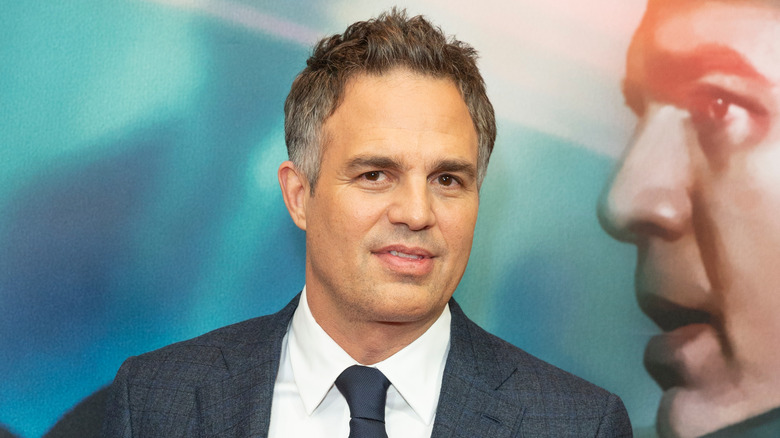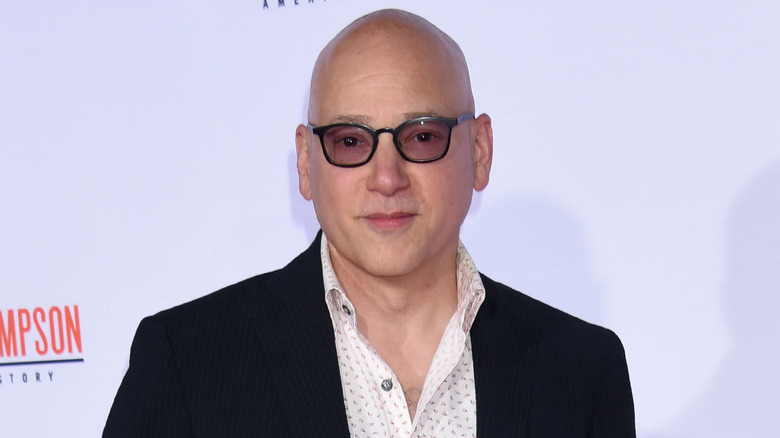Celebrities Who Experienced Major Health Scares
While there may be lots to envy about celebrity life (the parties, the designer clothing, the potential for vast wealth, et cetera), there is also a dark side, which can include chronic stress. In 2019, when Prevention profiled 27 celebrities who have dealt with anxiety and panic attacks, the focus was meant to be mental health, but it was clear from some of the profiles — including those of Selena Gomez, Selma Blair, and Michael J. Fox – that it is all but impossible to untangle the connection between stress and physical health. Of course, this isn't news to doctors and other scientists.
"The relationship between stress and illness is complex," wrote the author of a 2008 paper published in The Malaysian Journal of Medical Sciences. While short-term stress can actually help boost the immune system, chronic stress can undermine it. And while one's body's susceptibility to stress-related illness can vary from person to person, the fact remains that there are many health conditions that can be caused or exacerbated by stress, including type 2 diabetes, ulcers, ulcerative colitis, coronary artery disease and its related cardiovascular complications, and possibly some forms of cancer.
In fact, some of the major health scares that celebrities have experienced may be traceable to chronic stress, particularly those involving cardiovascular issues or a failure to practice adequate self-care. Let's take a look at celebs who experienced major health scares due to stress or other reasons.
Emilia Clark had two aneurysms right at the beginning of her career
Actress Emilia Clark was still new to show business when she won the role of the Daenerys Targaryen on HBO's "Game of Thrones." To cope with the stress of her newfound fame, Clark started working out with a trainer, she recalled for The New Yorker in 2019. It was during a 2011 training session that she "started to feel a bad headache coming on." The pain worsened, and she wound up doubled over in the locker room, "violently, voluminously ill."
As it turned out, Clark had suffered a "subarachnoid hemorrhage," which is referred to as an aneurysm or stroke. It required three hours of brain surgery to correct. But that was just the beginning. Clark's post-surgical pain was "unbearable," and she suffered neurological deficits, including aphasia, which is the inability to form words (via National Aphasia Association).
Fortunately, Clark recovered her neurological faculties. However, even before she even left the hospital, she learned there was another aneurysm in her brain. Because it was relatively small, she was able to wait until 2013 to have it resolved surgically. But that involved another difficult recovery, during which she spent a full month in the hospital. Clark hid her condition from the public, but decided to speak out in the 2019 op-ed, concluding, "I'm so happy to be here to see the end of this story and the beginning of whatever comes next."
Tiger Woods was in a devastating car accident
Pro golfer Tiger Woods has been involved in at least three serious car accidents, at least one of which led to a DUI arrest, according to Deadline. However, the one that occurred in February 2021 in Southern California may be the scariest yet, a 22-page collision report indicates (via USA Today).
Woods, who was driving nearly 90 miles per hour, made no significant attempt to steer or to brake in the seconds before his 2021 Genesis GV80 SUV crashed into a tree. Instead, he may have hit the accelerator by mistake (via CNBC). As a result of the crash, Woods suffered significant damage to his right leg, according to ABC News. After Woods was removed from the vehicle, which landed on its side just off the highway, Woods underwent a long surgery and numerous follow-up procedures.
Although Woods has remained mum on what may have led to this latest collision, the collision report revealed an empty pharmaceutical bottle at the scene and that Woods' blood pressure was "too low to administer any type of pain medication" in the immediate aftermath of the crash. In a statement issued on March 16, Woods indicated he was continuing his long recovery at home in Florida.
Amy Schumer wound up in the hospital for five days with a kidney infection
Amy Schumer, who survived a terrifying surfing accident while still in high school, was hospitalized for five days in 2018 with what she described on Instagram as a "horrible kidney infection" (via Us Weekly). A kidney infection occurs when bacteria get into one or both kidneys, according to the American Kidney Fund, which pointed out that "it is very important to treat kidney infections as soon as possible. Kidney infections that are not treated soon enough can cause permanent kidney damage or can spread to other parts of your body and cause an even more serious infection."
The bacteria responsible for kidney infections usually originate in some other part of the urinary tract (e.g., the bladder or the urethra) before making its way to the kidney(s). Flu-like symptoms, fever, chills, nausea, and vomiting are all signs of this infection. It can also involve pain in the back, groin, or flanks and issues with urination, including increased urinary frequency, pain or burning while urinating, blood or pus in the urine, and cloudy or foul-smelling urine.
Women are more likely to get kidney infections because their urethras are shorter, which makes it that much easier for bacteria to travel," according to the Mayo Clinic. The best way to avoid kidney infection is by avoiding any infection of the urinary tract, which can be accomplished by drinking lots of water, never "holding it" in, and urinating as soon as possible after intercourse.
Mark Ruffalo was diagnosed with a brain tumor
In 2001, when Mark Ruffalo was "at the height of his career," he woke up one morning just "knowing" he had a brain tumor, he told New York Magazine in 2003. Ruffalo's gut feeling spurred him to see his doctor, who took Ruffalo's concern seriously and ultimately diagnosed an "acoustic neuroma (via Men's Journal). An acoustic neuroma, also known as a schwannoma, according to the National Brain Tumor Society, can cause some of the same symptoms as vertigo ( dizziness, loss of balance, lack of coordination, et cetera), but Ruffalo had no symptoms. He just had a feeling.
Fortunately, Ruffalo's tumor was operable, albeit with a 30% risk of facial paralysis. On top of all this, his wife was expecting their second child any day. Ruffalo kept his diagnosis secret until after Keen was born and scheduled his surgery for two weeks later. Although the good news is the tumor was benign, the surgery did leave Ruffalo's face partially paralyzed (via Men's Journal).
What followed was a very dark time in Ruffalo's life. "He wouldn't take calls, wouldn't talk to anyone. He lost his equilibrium and started falling down a lot. ... He was at the peak of his career, with a newborn son — and he wasn't sure if he would ever work again, or even function," Men's Journal explained. Although it was slow-going, Ruffalo did make a nearly full recovery, according to Cancer Horizons.
Evan Handler survived a life-threatening form of leukemia
Actor Evan Handler, perhaps best known for playing Harry Goldenblatt, the husband of Charlotte York on "Sex and the City," was diagnosed with a life-threatening form of cancer, acute myeloid leukemia (AML), when he was 24 years old. AML begins in the bone marrow and then often quickly moves into the blood, spreading to other parts of the body, including lymph nodes, liver, spleen, brain, and spinal cord, according to the American Cancer Society.
Handler was not expected to live. Receiving the diagnosis was "devastating and horrifying and terrifying," Handler told Everyday Health in 2008. Making matters worse, he had a difficult time coping emotionally with his treatment, including with some of the medical staff, whom he found "arrogant" and "abusive."
"I didn't shy away from my anger and outrage," Handler admitted, but he also used those negative emotions as "energizing forces." That said, he doesn't believe he survived because he channeled his anger into determination. "I wouldn't attribute [my recovery] to any one thing — I mean, yes, I was determined to make it, but I'm sure there were many people who were just as determined, who didn't make it. A huge dose of luck and a bone marrow transplant in 1988 didn't hurt." Handler's career took a backseat to his transplant and the long recovery that followed, but by 1991 his comeback began and continues today (via IMDb).
After a brain hemorrhage, Sharon Stone had to start from scratch
In September 2001, Sharon Stone was rushed to the hospital after experiencing such excruciating head pain, it felt as if she'd been "shot," she explained on Oprah's Master Class. It turned out that Stone was having a brain hemorrhage. "My vertebral artery had ruptured and was now hanging by a thread," she recalled. "And for this entire time, I'd been hemorrhaging into my back of my head, my face, my head, my spine, and now my brain was shoved up into the front of my face." What began as an exploratory angiogram turned into full-on brain surgery, in which 22 platinum coils were placed in Stone's head in place of the damaged artery. But that was just the beginning. Stone had to re-learn how to "walk, hear, write, talk, remember, and everything, all over again."
It was one of the darkest times of Stone's life. "I lost so much," she recalled of her health odyssey, which also coincided with a period of career and personal disappointments. "When I got down to it, it's like being a Phoenix. I was burned to the ground. Everything I had been before ... I thought 'I'm not any of those things anymore.'" Nevertheless, Stone persevered, ultimately finding that "everything got richer" as a result of the experience. Likening what had happened to her as a sort of "death," Stone leaned into starting over: "Every death is a rebirth."
Courtney Love was "broken" by her experience with anemia but is recovering
On March 14, 2021, actress and musician Courtney Love announced on Instagram that she'd been dealing with severe anemia for the last year. Anemia happens when you're lacking red blood cells needed to carry adequate oxygen to your body's tissues," according to Mayo Clinic. Anemia can cause extreme fatigue, weakness, and chest pain, among other things.
Love's Instagram post revealed that her anemia had left her "basically bedridden" and "frail." "People," she wrote, "I've been sad, and extremely sick. Debilitated, in indescribable pain and in August at 97 pounds almost died in hospital from anemia (hemoglobin I had none)." For the first nine months of her experiencing symptoms, medical professionals did not take Love's complaints seriously, she explained in the same Instagram post, chalking it up to the fact addicts can be "stigmatized," with their reports of pain frequently dismissed as mere drug-seeking behavior.
It appears that Love is on the mend, however, now that she has been working with a "most empathic wise pain management" specialist." She did not say exactly what she has been doing to treat the underlying blood condition, or how her pain management specialist was dealing with her physical discomfort, but she did say that she has successfully been using CBD oil to treat her physical symptoms. "I used to scoff at cannabis/THC," the "100 percent sober" star went on to say, but "this isn't that."
Lil Wayne has had life-threatening, uncontrollable seizures
In March 2013, following a long night of work in the recording studio, Lil Wayne was found unconscious by one of his bodyguards. Rushed to the hospital, Wayne was put into a medically induced coma due to uncontrollable seizures, according to Today. Although Wayne's Twitter account was active in the next few days, TMZ reported that during this time, Wayne was "sleeping" and in critical condition. All of this came just six months after Wayne's hospitalization for seizures he experienced while aboard a private jet, according to The Guardian.
On March 29, 2013, Wayne went public with the state of his health. In a telephone interview with Los Angeles radio station Power 106, Wayne said that he is epileptic and therefore prone to seizures (via USA Today). "This isn't my first, second, third, fourth, fifth, sixth, seventh seizure. I've had a bunch of seizures, y'all just never hear about them," he's quoted as having said. "But this time it got real bad 'cause I had three of them in a row and on the third one, my heart rate went down to like 30%. Basically, I could've died." Wayne has been prescribed anti-seizure medication but has suffered additional seizures over the years (via Rolling Stone).
Lance Armstrong beat the odds against advanced cancer
Although the Tour de France is "the most prestigious and difficult race in cycling," according to Brittanica, until 1999 it had never produced any major sports heroes the way tennis, basketball, and American football have reliably done over the years. Then came Lance Armstrong, who crossed the finish line first in that year's Tour de France. While the victory should have been significant in and of itself, at least among biking and endurance sports fans, it gained an unprecedented level of mystique because just three years earlier, Lance Armstrong had been diagnosed with metastatic testicular cancer (via ESPN).
With early diagnosis and treatment, testicular cancer is curable, according to the Urology Care Foundation. Armstrong, however, had ignored early symptoms, including soreness in his groin, which he attributed to riding a bike for five to six hours a day. By the time he was diagnosed, the cancer had already spread throughout his body, including to his lungs and his brain.
"At that point, Armstrong was prepared to die," ESPN wrote in 1998. But with near-human determination and resilience, Armstrong survived both the cancer and the aggressive treatments that broke his body down to the point where he could hardly bike at all, let alone win seven consecutive Tour de France races. Although the records have since been stricken due to Armstrong having used performance-enhancing drugs, his victory against cancer will remain an inspiration to many (via The Cauldron).
Marcia Cross survived cancer and is proud to talk about it
During a routine visit with her gynecologist in 2018, actress Marcia Cross, who is best known for her roles on television's "Melrose Place" and "Desperate Housewives," was diagnosed with anal cancer, according to CBS News, with whom Cross spoke in 2019.
According to Mayo Clinic, this cancer is fairly uncommon and develops in the anal canal (the terminus of the digestive tract). Its symptoms include bleeding from the anus or rectum, pain or itching in the area, and a palpable mass or growth. It's treatable when found early but difficult to treat after it has spread to distant sites throughout the body. Fortunately, Cross' cancer responded to chemotherapy and radiation, which put the cancer into remission.
Cross has since worked diligently to get the word out about her diagnosis and treatment in an effort to destigmatize anal cancer, which, in 90% of cases is caused by the sexually transmitted virus, HPV (human papillomavirus), according to the Centers for Disease Control and Prevention. In Cross' case, HPV was the cause. It also caused throat cancer in her husband, Tom Mahoney, who survived after a "grueling" regimen of chemotherapy and radiation in 2009. Cross hopes that sharing her story will help others to talk about what otherwise might be "embarrassing symptoms."
Portia de Rossi was rushed to the hospital for an emergency appendectomy
On March 23, 2021, Us Weekly reported that "Arrested Development" alum and wife of Ellen DeGeneres, Portia de Rossi, had recently undergone emergency surgery to have her appendix removed. It all started on the night of March 17, DeGeneres said on her eponymous television talk show (via Us Weekly). "I'm sitting there watching TV with Portia, and Portia said, 'I'm not feeling well. I want to go to bed.' And it was like 8 o'clock. I'm not used to going to bed that early." After "conking out," DeGeneres awoke to the sounds of de Rossi groaning from another room.
"I get out of bed, and I find Portia on the floor on all fours," DeGeneres recounted. "And I'm like, 'Baby, are you OK?' And she's like, 'Yeah, I'm OK.'" But DeRossi was clearly not okay, and DeGeneres proceeded to rush her to the ER. During the ride to the hospital, de Rossi was in a great deal of pain, according to DeGeneres.
As it turned out, help came in the form of an appendectomy, which most people with appendicitis require to prevent rupture of the diseased organ, according to Cleveland Clinic. Although de Rossi experienced a lot of pain and was hospitalized for three days, according to People, it appears she'll make a full recovery.
Demi Lovato almost died from a drug overdose in 2018
On June 24, 2018, Demi Lovato nearly died of an overdose of drugs they purchased illegally from a drug dealer, whom Lovato alleges took advantage of them sexually before leaving them for dead, Lovato revealed in their four-part documentary, "Demi Lovato: Dancing With the Devil" (via NBC News Maine). Lovato was reportedly rushed to the hospital after being found unconscious by their former assistant. "My doctors said that I had five to ten more minutes," Lovato states in the documentary, which is "an intimate portrait of addiction" and "the process of healing and empowerment" (via CNN).
As a result of their overdose, Lovato suffered a heart attack and multiple strokes, leaving them with brain damage, they told reporters in a February press call reported on by CNN. Stroke-induced brain damage is irreversible, according to Oakbend Medical Center, which identified issues with motor and speech control, difficulty reasoning, and emotional problems as some of the most common consequences of stroke-related brain damage. "I still deal with the effects," Lovato confirmed. "I don't drive a car because there are blind spots in my vision. I also for a long time had a really hard time reading."
Martin Lawrence capped off several troubled years with a workout that nearly killed him
You probably would never know it from looking at him today, but comedian, actor, producer, and former boxer Martin Lawrence experienced a terrifying health scare in 1999. Shortly after arriving at his Westlake Village, California home after a jog, Lawrence suffered severe heat exhaustion and slipped into a coma, according to doctors at Los Robles Regional Medical Center (via Los Angeles Times). Although Lawrence woke up from the coma three days later, his condition remained critical, albeit stable and hopeful, when it was reported on by the Los Angeles Times one day after he had awoken.
Years later, in 2006, Lawrence spoke to ABC News about this pivotal moment that helped set him on a better course following several troubled years in the late 1990s, in which "his life was spiraling out of control." In May of 1996, he was found exhausted, dehydrated, and carrying a loaded pistol while wandering in LA. Two months later, he completed two months' probation for carrying a loaded pistol at Burbank Airport. In 1997, he was sentenced to community service for punching someone in a nightclub. "I felt like, in the coma, God laid me down and woke me up to be able to see a lot more clearer, and it's humbled me a great deal, you know?" Lawrence told ABC. At the same time, this experience, like all his life experiences, adds dimension to his humor, he remarked.
Kevin Smith survived a massive heart attack
If you're having a bit of trouble recognizing writer, comedian, and actor Kevin Smith in the photo above, it's not you, it's him. On February 25, 2018, while performing a series of standup comedy shows in Glendale, California, Smith suffered a massive heart attack, he revealed on Instagram the next day. Of his symptoms, Smith said that after that night's first show, he was feeling nauseous, but vomiting didn't help, and then he began "sweating buckets" and experiencing a heaviness in his chest.
Smith skipped the next show and high-tailed it to the hospital, where he was told that he had been walking around with a 100% blockage of his left anterior descending artery, a condition known in the medical community as "the widow-maker" because it is most often not survivable. In fact, his doctor told him that if the show had gone on, Smith would likely have collapsed and died.
Smith's own father died of a massive heart attack in 2003, and Smith joked that he always suspected that is how he too would go. But he was clearly grateful for a second chance after facing his "greatest fear." And he indicated that he planned on making lifestyle changes to better support his health going forward. Smith lost weight and went vegan soon after, according to Variety.
Beyoncé's pregnancy with her twins involved serious complications
Pregnancy can be a wonderful time for a woman, but 8% experience potentially dangerous complications, according to Johns Hopkins Medicine. One who did was Beyoncé, who experienced preeclampsia while pregnant with her twins (via Vogue). Also known as toxemia, preeclampsia is when a woman develops high blood pressure incident to her pregnancy (in other words, she develops the condition only during, and as a result of, being pregnant). High blood pressure is always worrisome because it can lead to stroke (via American Heart Association). But in pregnancy, it can be a sign that some of the expectant mother's organs, including her kidneys and liver, may not be working properly.
The good news is that the condition almost always resolves with the birth of the baby. The bad news is that some women, including Beyoncé, aren't even close to ready to give birth when their condition is diagnosed, often during a routine prenatal checkup. In Beyoncé's case, that meant having to go on bed rest for the duration of the pregnancy, which lasted more than another month. "My health and my babies' health were in danger, so I had an emergency C-section," she explained.
Kim Kardashian survived multiple pregnancy complications
Another celebrity who has had to deal with terrifying pregnancy complications is Kim Kardashian. Like Beyoncé, Kardashian was diagnosed with preeclampsia and an even higher-risk and far more rare condition known as "placenta accreta" during her two childbirths, according to E! Online (Kardashian turned to gestational surrogacy for her next two babies). And this is after Kardashian had already overcome fertility issues to become pregnant with her second child, who was conceived via IVF.
Placenta accreta, which is observed in just 0.2% of pregnancies, is when the placenta, an organ the body manufactures to provide nutrients to a developing fetus and which is (and must be) expelled soon after childbirth, attaches to the musculature of the uterus rather than its lining, according to Brigham and Women's Hospital. As a result, "the placenta cannot normally deliver after the baby's birth, and attempts to remove the placenta can lead to heavy bleeding." It's a serious and potentially life-threatening complication but one that can be managed by experienced medical professionals, but it can leave the mother with internal damage, including scarring.
Having conceived via IVF, as Kardashian did, is one of the known risk factors for placenta accreta. Others include Cesarean section(s), other uterine surgery, and previous placenta accreta. After two placenta accretas, leaving Kardashian with internal damage requiring at least five surgeries, Kardashian and her then-husband Kanye West entrusted the carrying of their next two babies to a gestational surrogate.
Mandy Moore had to deal with a scary blood disorder after giving birth to her son
In February 2021, Mandy Moore gave birth to her first child with husband Taylor Goldsmith, a son, Augustus "Gus" Harrison Goldsmith (via USA Today). Throughout her pregnancy, Moore posted updates on Instagram, including her diagnosis with a blood disorder at the beginning of her third trimester (via Romper). "Weekly platelet check at the hematologist," she wrote in early February, for example. "My platelets have dropped exponentially during pregnancy."
Moore, who had hoped to have a home birth, had to change her plans due to this complication, which goes by the scientific name "gestational thrombocytopenia," according to a 2016 case study published in Maedica. Per the study, gestational thrombocytopenia is the "second leading cause of blood disorders in pregnancy" (the first leading cause is anemia). Most gestational thrombocytopenia cases are mild, according to the website of Dr. Thais Adibaldi, "and don't pose any problems to the woman or her baby." But once the platelets go below a certain level, it rules out home birth.
Moore gave birth without incident on March 26, and her platelet count has been rising, Us Weekly reported on April 12, but it had still not bounced back to normal as of that date. "I'm on a mission to do whatever I can to get [my platelet count] to a solid place, so I don't have to wonder or worry during the next pregnancy," she posted to Instagram (via E! Online).


















